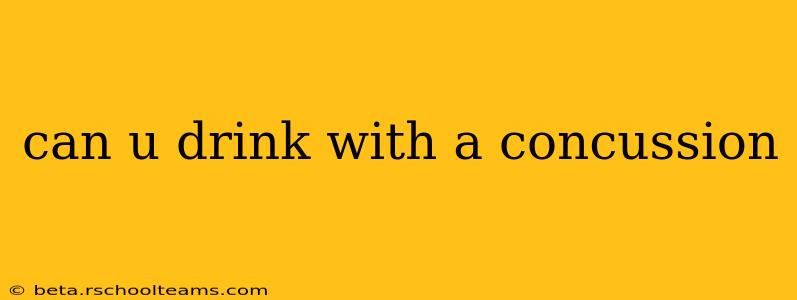Can You Drink With a Concussion? A Definitive Guide
A concussion, also known as a mild traumatic brain injury (mTBI), is a serious injury that requires careful management. One crucial aspect of recovery is avoiding alcohol. The short answer is: no, you should absolutely not drink alcohol if you have a concussion. Doing so can significantly hinder your recovery and potentially worsen your symptoms.
This article will explore the reasons why alcohol and concussions are a dangerous mix, addressing common questions surrounding this topic.
Why is Alcohol Harmful After a Concussion?
Alcohol is a depressant, meaning it slows down brain function. After a concussion, your brain is already vulnerable and working hard to heal. Alcohol further impairs this process in several ways:
- Increased Inflammation: Alcohol can increase inflammation in the brain, exacerbating the damage caused by the concussion. This inflammation can prolong recovery time and potentially lead to more severe long-term consequences.
- Delayed Healing: The brain needs time and resources to repair itself after a concussion. Alcohol interferes with this process, slowing down the healing and potentially increasing the risk of complications.
- Exacerbated Symptoms: Alcohol can worsen existing concussion symptoms, such as headaches, dizziness, nausea, and cognitive impairment (difficulty concentrating, remembering things, etc.). This can significantly impact your quality of life during recovery.
- Increased Risk of Complications: In severe cases, combining alcohol with a concussion can increase the risk of more serious complications, including prolonged post-concussion syndrome (PCS). PCS can involve persistent symptoms lasting weeks, months, or even years after the initial injury.
- Drug Interactions: If you're taking prescribed medications for your concussion (such as pain relievers), alcohol can interact negatively with these drugs, leading to unwanted side effects or reducing the medication's effectiveness.
How Long Should I Avoid Alcohol After a Concussion?
There's no single definitive timeframe for avoiding alcohol after a concussion. The recovery period varies greatly depending on the severity of the injury, individual factors, and the effectiveness of treatment. It's crucial to follow your doctor's recommendations closely. Your doctor will assess your specific situation and provide guidance on when it's safe to resume alcohol consumption, which could be weeks or even months after your injury. Rushing back to alcohol could significantly prolong your recovery or cause further harm.
What are the Symptoms of a Concussion?
Recognizing concussion symptoms is crucial for proper management and recovery. These can include, but aren't limited to:
- Headache
- Dizziness
- Nausea or vomiting
- Balance problems
- Sensitivity to light or noise
- Blurred vision
- Confusion
- Memory problems
- Sleep disturbances
- Fatigue
What Should I Do If I Suspect a Concussion?
If you suspect you've suffered a concussion, seek immediate medical attention. A healthcare professional can properly diagnose the injury and recommend appropriate treatment. This may involve rest, medication, and monitoring for complications. Never attempt to self-diagnose or treat a concussion.
Can I Drink Coffee or Other Caffeinated Beverages After a Concussion?
While alcohol is strictly prohibited after a concussion, the advice regarding caffeine is less clear-cut. Some individuals find caffeine exacerbates their symptoms, while others tolerate it well. It's best to consult your doctor or healthcare provider regarding caffeine and other substances during your recovery.
What about other substances like Marijuana?
Similar to alcohol, other substances that alter brain function should be avoided after a concussion. Marijuana, in particular, can interact with the brain in unpredictable ways, especially after an injury. Always discuss any substance use with your doctor to ensure your safety and optimal recovery.
In conclusion, avoiding alcohol after a concussion is non-negotiable. It's crucial for your health and recovery. Follow your doctor's advice, prioritize rest, and avoid substances that could further harm your brain during this critical healing period. Your well-being depends on it.
